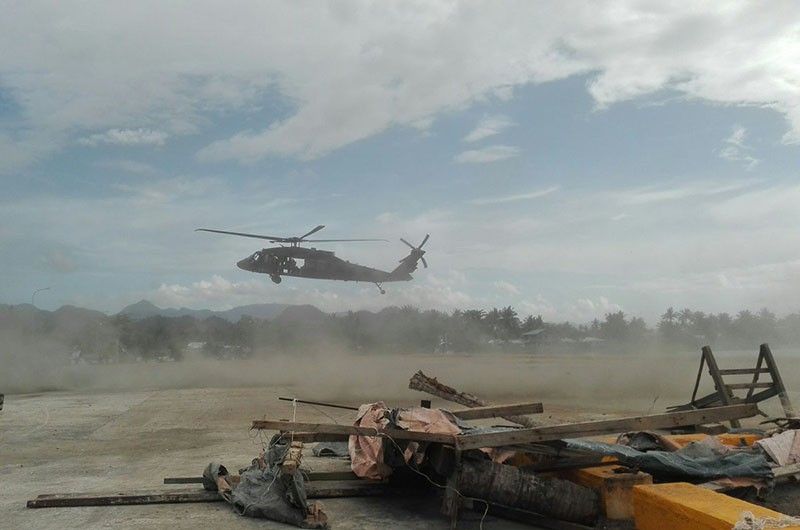Commentary: A renegotiated Mutual Defense Treaty is neither simple nor a panacea for bilateral ties

As US Secretary of State Pompeo prepares prepares to visit the Philippines following his attendance at the Trump-Kim Summit in Vietnam, an important question hangs over the United States-Republic of the Philippines relationship: Is the historically tangled and tumultuous alliance in unprecedented trouble?
This was the crux of a ”1.5-level dialogue” implemented by The Asia Foundation and the Ateneo School of Government, supported by the US Embassy.
Officials, experts and private sector representatives from both countries conducted a thorough assessment of the state of relations between the two countries against the backdrop of important developments.
Since President Rodrigo Duterte was elected in June 2016, mutual anxieties have risen due to his sharp criticisms about the US, calls for an “independent” foreign policy, decision to “shelve” the Philippines legal victory in the Permanent Court of Arbitration (PCA) ruling on the South China Sea while improving ties with China and Russia among other countries, reluctance to fully implement already agreed upon initiatives such as the Enhanced Defense Cooperation Agreement (EDCA), and human rights violations in the domestic war against drugs.
But it is the Philippines’ Secretary of Defense Delfin Lorenzano’s December 2018 call for a review of the bilateral Mutual Defense Treaty that has raised the specter of the end of the bilateral alliance.
RELATED: Defense chief seeks Philippine-US treaty review
In fact, despite alliance anxieties, actual military and security cooperation is robust and what the alliance needs now is not new, expanded binding commitments but more explicitly expressed political commitment to the alliance concretely exhibited through the implementation of a range of already agreed alliance activities.
Moreover, the alliance is a critical but not the only part of the overall US-Philippine relationship which is generally healthy measured by public opinion as well as commercial and people-to-people ties. Compared to historical crises in the US-PHL alliance and relations, the present period requires constructive engagement not collective hand-wringing.
Constraints and cautions should also guide any pursuit of more explicit and increased security obligations through the MDT.
'Inauspicious timing'
First, it is difficult to think of a more inauspicious time to seek expanded commitments via a renegotiated Mutual Defense Treaty.
Given the post-President Duterte condition of US-Philippines relations and respective domestic politics, creating constituencies across publics, legislatures and executive branches in both countries to expand and enhance legally-binding security commitments by the US to the Philippines is unrealistic.
The uncertain tenure of an acting US Secretary of Defense further complicates bureaucratic matters on the US side.
More importantly, as Manila readies for midterm elections this May (and another presidential one in 2022) and with the US 2020 general election campaign already underway, an MDT review is unlikely to move swiftly or definitively, and particularly in the Philippines is almost sure to get mired in domestic politics.
In the US, despite mainstream initiatives such as the Asia Reassurance Initiative Act (ARIA), a majority of the public on both the left and right are skeptical of current international military and security commitments such as in Afghanistan and Syria and Iraq much less new ones.
And while the American policy-making elite have turned sharply against China, the public lags behind. Such factors combined make expanded MDT commitments from the US improbable.
'Enhanced US commitment might not deter China'
Second, too many Filipinos believe that a stronger US alliance commitment through the application of Article V to Japan’s administrative control of the Senkaku islands is what primarily deters Beijing from wresting the islands away from Tokyo; and appear to want a similar commitment for its claims in the Kalayaan Islands Group (KIG).
Leaving aside the very different histories and natures of the two alliances, such a comparison underweights other considerations.
Certainly, Beijing takes America’s Article V invocation into account. But the more important factor may well be that the PLA and its political counterparts fear that Japan’s military on its own (and certainly with US backing) would defeat or severely hobble China in the event of an armed conflict—a risk that would be devastating militarily and for the CCP’s hold on power.
Filipinos rarely if ever mention that some in Tokyo are unsatisfied with the US invocation of Article V, regarding it is as insufficient support for Japan’s legal right as distinct from administrative control of the islands.
The point is that even enhanced US commitment via Article V in the case of the Senkakus is not the only or even primary constraint on China’s aggressions and has not fully satiated Japan’s demand for the US’s enhanced alliance commitment.
Moreover, this commitment has had little impact on mitigating much less resolving other challenges in the US-Japan alliance such as the US military presence in Okinawa. It is not far-fetched to think that enhanced US commitments to Manila will not resolve a myriad of other challenges that are part of alliance management.
Uncertain results
Third, the history of alliance commitment reviews and renegotiations elsewhere reveal mixed or unanticipated results. The renegotiation of the US-Japan security treaty led to huge protests in Japan. The recalibration of US-Thailand security relations as recently as 2012 has done little to solve post-1975 and post-Cold War challenges in that alliance.
Neither case argues against reviewing the US-PHL alliance. But they do argue for a well-crafted and considered process that is deliberative rather than reactive.
In the meantime, the most important mutual alliance reassurance for both countries is to create the conditions for public commitment to the alliance and more determined implementation of key, active, and agreed elements such as the Enhanced Defense Cooperation Agreement, maritime security cooperation including in the Sulu Sea, continued robust counter-terrorism cooperation and work together on training and capacity-building.
US-PHL relations have weathered far worse than the current tempest. Reviewing and updating the MDT may be necessary but it will not be simple and is not the panacea for what ails the relationship today.
Satu Limaye is director, East West Center in Washington and Senior Advisor, Center for Naval Analyses (CNA Corp.). The views expressed are entirely personal.
- Latest
























